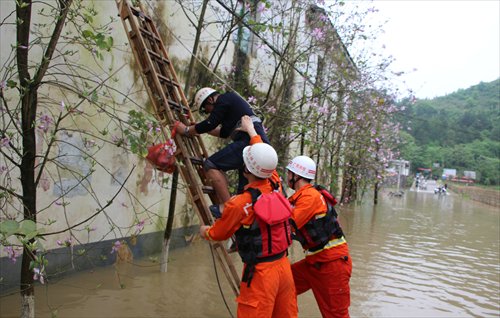HOME >> CHINA
El Nino nuisance
By Zhang Hui Source:Global Times Published: 2016-4-14 19:42:36
Weather phenomenon gives China a taste of damage climate change may bring

A river in Ji'nan, East China's Shandong Province is parched on April 12. At this point, there had been no rain for 58 days. Photo: CFP

Firemen from Yangshuo, Southwest China's Guangxi Zhuang Autonomous Region, rescue a man trapped in his house by flood on April 13.Photo: CFP
The weather in China has been a tale of two extremes in the past few weeks, with continuous heavy rain in southern China and sustained drought in the north.Observers linked the recent bad weather with the prolonged El Nino phenomenon, which is being boosted by climate change.
Experts warned that climate change and radical weather will become more common and powerful in the future, with all countries needing to work to lessen its impact.
Heavy cost of adverse weather
Southern China including Guangdong, Guizhou, Jiangxi and Hunan provinces have witnessed heavy rainstorms since late March, and the rainfall in many regions has reached double the historical average, according to en.weather.com.cn, a public weather service under the China Meteorological Administration.
Shenzhen International Airport issued this year's first red alert on March 22 due to heavy rain, which caused the cancellation of more than 200 flights, stranding 6,000 passengers.
Away from the soaked south, the temperature in much of northern China reached nearly 30 C last week, a new high for this year. Due to a shortage of rainfall, provinces such as Henan and Shaanxi are facing drought.
Globally, due to El Nino, countries along the Lancang-Mekong River have been hit with droughts since the end of 2015, and China has been discharging water since April to those affected countries.
El Nino is the name given to an interaction between the ocean and atmosphere that causes a band of warm water to appear in the east-central Equatorial Pacific, changing temperatures and rainfall in many countries. It occurs one every two to seven years.
Yang Fuqiang, a senior advisor on climate and energy at the Natural Resources Defense Council, told the Global Times that dramatic climate change has aggravated the 2015-16 El Nino.
"As climate change grows stronger in the future, China will be among the countries that are hardest hit by its impact," Yang said.
China's flood control authorities warned in late March that heavy floods are very likely on the Yangtze River this summer due to the prolonged El Nino effect.
The ongoing El Nino, which began in September 2014 and is expected to come to an end in May, is quite similar to the one which triggered the heavy flooding of the Yangtze in 1998 that killed 1,320, the Xinhua News Agency reported.
According to Yang, the changing climate has led to a fast increase in temperatures, which could cause changes to the virulence of some bacteria and viruses.
"Human health will be threatened by more aggressive bacteria and virus, and we will also encounter some new viruses," Yang said.
Worsening climate change also threatens China's scarce water resources, as glaciers on the Qinghai-Tibet Plateau, a vital water catchment area for China's major lakes and rivers, accelerate their meling, Li Yan, head of climate and energy at Greenpeace China, told the Global Times.
The Qinghai-Tibet Plateau glaciers have shrunk from 53,000 square kilometers to 45,000 square kilometers in the past 30 years, Xinhua reported in 2014.
Other negative impacts China may face include increased smog, worse harvests and more severe natural disasters, such as typhoons, experts said.
Reducing the human factor
According to Li, climate change is closely linked to human activities after the Industrial Revolution, which led to global warming through the release of greenhouse gases.
China, the biggest producer of the most common greenhouse gas, carbon dioxide, should shoulder more responsibility in reducing it, experts said.
China has taken series of measures to cut coal use and develop clean energy in the past several years, and has closed down about 1,000 coal mines nationwide, media reported.
Meanwhile, China needs to plan ahead for increasingly common and stronger radical weather conditions, such as improving the nation's drought resistance capability and using more flood-resistant materials in construction projects, especially in poverty-stricken areas which are the first and hardest hit in disasters, Li said.
Experts agree that global climate change needs international cooperation to reduce its impact.
Wang Gengchen, a research fellow with the Insitute of Atmospheric Physics at the Chinese Academy of Sciences, told the Global Times that the signing of the Paris deal on April 22, which mandates a worldwide action plan to limit global warming to 2 C, will significantly help control greenhouse gas emissions all around the world.
About 130 countries expressed their support for the deal, according to the UN.
"The signing shows that the majority of countries in the world finally agreed that human activities have led to climate change," Wang said.
Posted in: Society